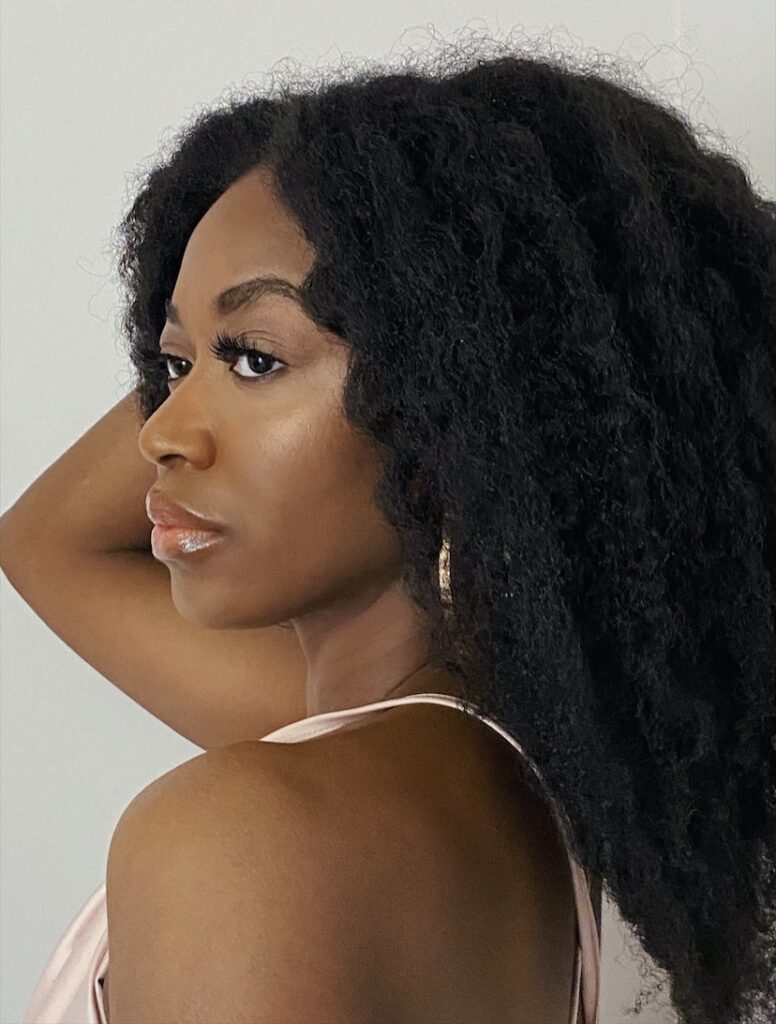- Work Hard
- 2nd Oct 2021
- 2.3k Views
- 0
- 8 minutes
Sunday sit-down with…Ngozi Ossai, GOZI Haircare

Our hair is a key part of our self-expression. But when you’ve been told all your life that your natural hair is ‘difficult’, ‘unprofessional’ or even downright ‘wrong’, what does that say about you? Biomedical scientist Ngozi shares the challenges she’s faced growing up with black hair and how she’s now empowering Black women everywhere to embrace their natural locks.
For many of us, our hair is our crowning glory.
It makes us who we are and is a big part of our identity. And equally, we’ve all had those classic ‘bad hair days’ that can really make us feel self-conscious, affecting our mood, confidence and sometimes even our productivity. Taking pride in our hair is important – and that’s not just on an aesthetic level.
So, imagine walking into your local hairdresser’s to be told that your natural hair is ‘too thick’ or ‘difficult’ to style.
Our hair is a part of how we express ourselves, our style and our culture. Haircare is a choice. Our choice. Being stripped of that choice is being stripped of our voice – and everyone deserves to have their voices heard.
It seems this has been the case for too many Black women throughout history. But black hair has not only been coined as being difficult to manage; because of the styling challenges associated with it, black hair has also been seen by some as carrying connotations of untidiness, uncleanliness, and unprofessionalism. (All ridiculous, we know, but surprisingly prevalent and significantly restricting).
Biomedical scientist Ngozi Ossai experienced all this and more growing up. The main piece of advice she received was to chemically relax her beautiful, curly afro so that it would be easier for her to manage. But that’s because the only haircare available to her had always been designed to manage hairstyles determined by Western beauty standards.
It was during her A levels that Ngozi really began to research haircare products specifically designed for black hair. The main problem she faced? She struggled to find any.
But in her struggle, Ngozi spotted an opportunity – and that initial search for products to use on her own hair soon fuelled a desire to channel her scientific expertise and passion for her Nigerian heritage into setting up her own business. And so, GOZI Haircare was born. Now, Ngozi spends her time empowering other women to embrace their natural weaves too – providing Black women with haircare products made from natural ingredients and specially designed to care for their afro-textured hair.
As the 2021 Black History Month’s theme is ‘Proud To Be’, we’re all encouraged to celebrate who we are and share other people’s pride in their heritage and culture. So we thought it would be particularly timely to catch up with Ngozi to find out how she eventually came to accept her natural hair – despite the flack she had always received for it – and how she now uses her experience to help hundreds of women embrace their ethnic roots, too.
Talk us through what it was like growing up with afro-textured hair?
When I was younger, I had a huge, natural, beautiful afro that was tightly curled. I hated anyone touching my hair apart from my mum or sister, because it was painful when they did – as they didn’t know how to, properly. Going to the hairdressers wasn’t fun for me. They were impatient with my hair and complained about it being too thick or difficult to work with, and sometimes even increased the price.
This led to my mum taking care of my hair mostly and, at one point, I even rocked a short ‘fro. Growing up, I eventually relaxed my hair after much complaining from hair salons, as they advised that it would make it easier to manage. But even when it was relaxed, the hairdressers still had problems styling my hair. So, I began to think that maybe relaxers or straighteners weren’t the fix I needed but, rather, that my haircare routine needed improvement.
What made you start to embrace your natural hair?
Before 2010, I never really paid much attention to my hair, so I don’t think time was the issue. But it was my lack of knowledge. In 2010, I left home for the first time to study my A levels and I had to be more independent. That included caring for my hair, as my mum always used to help me.
This was when I became more aware of my tightly curled hair and other hair types in general. I already had really full, long and chemically relaxed hair, but around this time I realised that my main problem was that I wasn’t happy with my hair. It was apparent that although my hair was long and thick, it wasn’t healthy.
Do you think there should be more representation of natural black hair in the media?
Of course! 100%. Every adult and every child deserves to see people that look like them in the media. We all need to relate to our environments and it’s unfair when there’s no representation of how you look streaming globally. This can affect confidence and contribute to social interaction.
While we may style our hair to reflect our own individual choices, our hair is still being interpreted by a mainstream gaze and that interpretation is often wrong. There’s still an expectation to conform to a general aesthetic standard and a perception that sometimes attaches a stigma to black hair – such as in schools or professional settings, resulting in discrimination and job loss. There needs to be more education to highlight this.
What inspired you to get into the haircare industry?
During my A Levels, I started becoming really curious about black hair and how differently Black women chose to wear their hair and why. This led me to research the history of black hair. I came across the natural hair movement which, at that time (during the 2000’s), really gained momentum. The essence was to create a new era where women embraced their natural hair, their uniqueness and understand that their beauty is not defined by the industry which bases its norm on Western beauty standards.
This was when I knew I wanted to decide my own standard of beauty and help other women do that, too. My frustration at finding it so hard to find products that worked for my tightly curled hair, or more information about how to care for it correctly, became my inspiration. So, my curiosity, research, my decision to create a YouTube channel to chart my natural hair journey and relate to more women like me, and a keen desire to solve a problem ignited a spark that has become GOZI Haircare as you see it today.
What’s GOZI Haircare all about?
GOZI Haircare provides a range of uniquely formulated, afro-textured haircare products using natural ingredients and specialist advice in the natural haircare industry.
What’s the science behind your products?
The science of GOZI Haircare is based on the needs of black hair and healthy hair growth. With the difference in our hair structure, Black women with the afro-textured hair type tend to have more curls, so oils naturally produced in the hair follicles have a harder time reaching the ends of curled hair. This causes dryness and makes it easier to break. This then creates moisture retention – a very important component for black hair. This is why our products concentrate on moisture retention and aiding healthy hair growth.
What advice would you give women on how to style, care and embrace their natural hair?
My main advice is to be patient with your hair and observant of its needs. It’s not a one-size-fits-all approach. Like everything else, you need to tailor your haircare to you as an individual.
For me, the whole essence of the natural hair movement is to allow women to embrace their natural hair, irrespective of the history of black hair. For many reasons, women want versatility with their hair at different times, which is alright. But what I promote at GOZI Haircare is that – first and foremost – you should embrace your natural hair, its beauty and its uniqueness. So, if you want to wear your natural hair ‘in’ – so for example, in protective hairstyles – or ‘out’, you have access to the relevant products and knowledge to care for it properly. Caring and loving your hair in its natural state first is the goal.
What’s next for GOZI Haircare?
Growth and scale up. Our customers are always at the heart of all our decisions, and the main goal is to be that go-to haircare brand when you think of how to care for your hair.
Want to find out more about Ngozi’s journey or how GOZI Haircare’s products can help you care for your hair? Visit her website, Facebook or Instagram










Comments